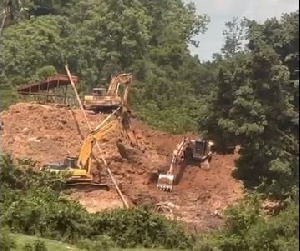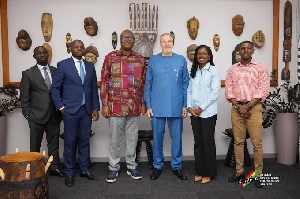- Home - News
- Elections 2024
- News Archive
- Crime & Punishment
- Politics
- Regional
- Editorial
- Health
- Ghanaians Abroad
- Tabloid
- Africa
- Religion
- Photo Archives
- Press Release
General News of Thursday, 5 June 2025
Source: www.ghanawebbers.com
Corrupt chiefs, politicians, others fuelling galamsey in Ghana – Report
A new study by the Global Initiative Against Transnational Organised Crime highlights corruption in illegal mining. This practice, known as galamsey, is widespread across Ghana.
The report claims that political figures, security officials, and traditional leaders are involved in corrupt activities. These individuals benefit from the lucrative artisanal and small-scale gold mining (ASGM) sector.
Galamsey thrives with support from powerful people. Metropolitan, Municipal, and District Chief Executives (MMDCEs) allegedly exploit their positions for personal gain. Some MMDCEs provide financial backing for illegal operations and protect political loyalists engaged in galamsey.
The report states that this issue is not limited to one region. Political actors, police officers, customs agents, and chiefs profit from illegal mining across various regions.
Land grabbing and manipulation of concession allocations are common practices. The report mentions a 2018 case involving Kinross Gold. The company settled with the US Securities and Exchange Commission over bribery allegations related to concession approvals in Ghana.
Corruption worsens due to delays in Ghana’s mining licensing process. Over a third of respondents waited more than 12 months for a license. Many miners pay high ‘facilitation fees’ that can exceed official costs by 150%. These barriers often push miners to bypass legal routes entirely.
The report also reveals issues within security operations aimed at tackling galamsey. Operation Vanguard, a military-police task force launched in 2017, faces internal corruption problems. A former member disclosed that some illegal sites were excluded from enforcement due to bribes paid to senior officers.
In one case, officers released excavators seized from an illegal site after learning it belonged to a district chief executive. In another instance, a prosecutor was mysteriously removed from a case against a foreign national.
A government official quoted in the report said constant interference from influential figures makes law enforcement difficult.
These findings raise concerns about the government's promises to combat illegal mining and protect Ghana's natural resources. The report concludes that addressing unlicensed ASGM requires confronting the political and institutional corruption behind it.











